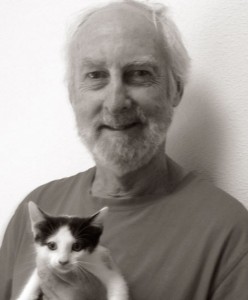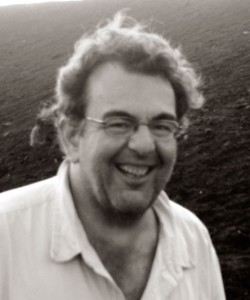WE DID a joint interview with Damien Broderick and Paul Di Filippo, authors of SCIENCE FICTION: THE 101 BEST NOVELS–1985-2010, drawing on the Q&A format used in The New York Times Book Review’s “By The Book” column, which employs the same set of questions with all interviewees. We’re taking this liberty since it is not likely that the NYTBR will be talking to a fulltime science fiction writer any time soon (going by the Old Gray Lady’s general haughty attitude towards the genre). —Luis
What book is on your nightstand now?
BRODERICK: A curiously 20th century question. Barbara, my wife, has a Kindle, which contains many books. I don’t, but I read a lot on my computer screen—which is too large to take to bed—and I always chew through several books at the same time, propped up by turns on a lectern and pinned open so I don’t have to hold the damned things in my arthritic fingers. Literally, the book beside my bed is whichever one I happen to have with me. Last night it was Phil Dick’s FLOW MY TEARS, THE POLICEMAN SAID, which I haven’t read for decades. The night before it was Salinger’s RAISE HIGH THE ROOFBEAM, CARPENTERS, ditto. Tonight it might be J. Storrs Hall’s BEYOND AI, or Russell Blackford’s FREEDOM OF RELIGION & THE SECULAR STATE, but probably not Samuel Delany’s THROUGH THE VALLEY OF THE NEST OF SPIDERS, which is sitting menacingly on the kitchen table.
DI FILIPPO: My night table is covered with comics. Giant stacks of graphic novels (STEVE CANYON, DYLAN DOG) and “floppy” issues from Marvel and DC. I’m also reading the new Otto Soglow collection from IDW. But why only comics? Because at the end of a long day usually devoted to reading “real” books for review purposes, comics are my decompression addiction. The blend of visuals and (minimal) text is soothing after concentrated prose in large doses. That said, in my workspace is a stack of five new fantasy novels I need to review for B&N. I shan’t reveal the titles except to hint that all five are by women authors. Maybe I’m subconsciously working toward FANTASY: THE BEST 101.
What was the last truly great book you read?
BRODERICK: If you’d said “truly great novel” I might give a different answer, but I’m a hard audience these days, I’d probably say Bellow’s HERZOG, which I haven’t read since I was 21. Let’s see… Perhaps GÖDEL, ESCHER, BACH, and it’s more than 30 years since I read that one.
DI FILIPPO: Pynchon’s AGAINST THE DAY was mighty impressive. But I almost think his INHERENT VICE was “greater” due to its organic unity and conciseness. In either case, he’s the one author I automatically think of when questions of this nature are posed.
Are you a fiction or a nonfiction person?
BRODERICK: Totally both. I can go on binges—as with the Salinger stories, just reread, and a number of the Lord Peter Whimsy social mysteries by Dorothy Sayers, and Peter Carey’s later novels, such as THEFT and MY LIFE AS A FAKE, and a number of the stout novels by Kim Stanley Robinson. But I also dote on informed books about science (which I reviewed in a previous life) and used to be obsessed with literary theory, the more bizarre the better (and the more bizarre the more fun to whack them about the head and shoulders until they yelped, except that they never did because they weren’t paying attention to anyone but their claque).
DI FILIPPO: Like Damien, I’ll have to opt for a balanced diet approach—ideally. Though I suspect I read more fiction on the whole. Fiction—the writing and reading thereof—will always be my first love, over the “true” stuff. I can imagine a livable world containing no non-fiction prose, but not one containing no works of the imagination.
What was the best book you read as a student?
BRODERICK: Arthur Koestler’s astonishing, polymathic folly THE ACT OF CREATION, which was published in 1964 when I was halfway through my first degree. It definitely wasn’t on anyone’s syllabus, but I dragged it into every topic I studied.
DI FILIPPO: Oh, goodness, that’s a puzzler! I left college in 1979 without ever earning my degree. Stopped about two courses short out of disgust at a horrid job market and realization that a degree would not confer any advantages to a fiction writer wannabe, which I was. My last few courses I attended very desultorily, even failing one for the first time in my career, after maintaining nearly a 4.0 average for years. I suspect I blanked out memories of those final books. However, in that same year of 1979 Deborah Newton and I went to Europe, and I toted along a volume of SHAKESPEARE’S COMPLETE PLAYS, having gotten hooked in college but not yet read them all. Maybe that counts as the tail end of my college reading!
What were your favorite books as a child?
BRODERICK: All manner of science fiction, although that started with comics and radio serials rather than books. Edgar Rice Burroughs’s Mars books were pretty tasty, and I was dumbfounded to learn that my mother had been fond of them, and the Tarzan novels, when she was a kid. Then the convulsion of discovering sf paperbacks when I was 14 or 15: Clarke’s THE CITY AND THE STARS and CHILDHOOD’S END, Bester’s THE STARS MY DESTINATION and THE DEMOLISHED MAN, van Vogt’s SLAN and THE VOYAGE OF THE SPACE BEAGLE (a novel I refused to borrow from the library because I assumed it was about a puppy dog in a spaceship, strictly for the little kids—and what a shock when I finally cracked the covers and discovered Nexialism), and eventually the serials in second hand copies of New Worlds and Galaxy and Astounding. Sigh. You can’t go home again, I know.
DI FILIPPO: Even at the age of 13, my tastes were as catholic as they are now. I could enjoy everything from Andre Norton to J. G. Ballard, for whatever each type of book offered. But perhaps the only book I chose to re-read several times was Brian Aldiss’s GREYBEARD. Its portrait of our waning civilization (no new children are born) fascinated me. The poetic description of a world reverting to nature had much allure for a kid who enjoyed being out in the woods as much as reading.
Do you have a favorite fictional character?
BRODERICK: Well, in the same spirit of the indelibility of childhood impact, I suppose Gully Foyle from THE STARS MY DESTINATION. I know he’s a cartoon, portrayed with absurdly kinetic force against a dubiously romantic and horrific background, but man, what a jolt! What a jaunt!
DI FILIPPO: That would have to be Superman! Or maybe in my more mature consideration, Smoky Barnable from Crowley’s LITTLE, BIG.
If you could meet any writer, dead or alive, who would it be?
BRODERICK: Truthfully, it would be me, when I was 19 or 20 and just getting started. I’d have a lot to share with that poor kid. But as my wife points out, would he listen for a moment to this old fart? Maybe not. Maybe that’s the point. If time machines are ruled out (preventing me from meeting Joanna Russ, who once furiously suggested that I jump under a bus), I don’t think it would be a single person. Sf is a collective endeavor of 1001 prickly individualists, and we discover ourselves in conversation conducted through our stories and in person when possible, at conventions and writing workshops and in blogs and fanzines… So the writers I’d like to hang out with would include most of those featured in SCIENCE FICTION: THE 101 BEST NOVELS, from Atwood and Le Guin to Pam Sargent and Chip Delany and James Morrow, Peter Watts and George Zebrowski, Ken MacLeod, Charlie Stross, John C. Wright, Naomi Novik and Kathleen Goonan and… well, Paul Di Filippo, whom I’ve never actually met . And, importantly, writers who are critics: John Clute, Gary Wolfe, Bruce Gillespie, Istvan Csicsery-Ronay, Jr. More, and yet more.
DI FILIPPO: Neil Young.
What do you plan to read next?
BRODERICK: There’s that immense new novel by Delany sitting in the kitchen. And Jim Carpenter’s scholarly book about the ubiquity of parapsychological connections between us all, FIRST SIGHT. And I really must catch up some time with Lisa Randall’s WARPED PASSAGES: UNRAVELING THE UNIVERSE’S HIDDEN DIMENSIONS and KNOCKING ON HEAVEN’S DOOR. And and and and…
DI FILIPPO: Whatever an editor assigns me for review. That acknowledgment is both sad and gratifying, in equal doses.
Editor’s note: The Otto Soglow collection from IDW is great, long overdue.


Write a Comment